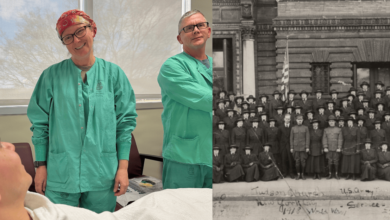Long Covid in NHS staff going undiagnosed, study suggests

A third of nurses have symptoms consistent with long Covid but only a fraction have a formal diagnosis, a new study has found.
Out of more than 5,000 NHS workers surveyed who had contracted Covid-19, 33.6% reported ongoing symptoms that would suggest they had post-Covid-19 syndrome (PCS).
“We know that more infections mean more people are at risk of developing long Covid”
Danielle Lamb
However, only 7% of the 5,248 had been formally diagnosed with long Covid, according to the study, the results of which were weighted to better represent the demographics of the workforce.
Occupation data provided in the study showed that 29.7% of the sample were nurses but that nurses represented 34.9% of the staff with suspected long Covid.
Meanwhile, doctors represented 8.3% of the sample and 5.8% of the group with PCS symptoms.
In light of the findings, a long Covid nurse campaigner has called for action from the UK chief nursing officers (CNO) to better protect nurses from Covid-19 and support those with PCS.
The study was led by researchers at King’s College London and University College London – including nursing academic Professor Dame Anne Marie Rafferty – and involved data from 18 NHS trusts in England.
It is part of the wider NHS CHECK study, which surveyed staff at the participating trusts on four different occasions between April 2020 to May 2023.
The study used the National Institute for Health and Care Excellence definition of long Covid, which stipulates that symptoms must last for 12 weeks or more after a Covid-19 infection.
Of the group who were thought to have long Covid, the most common symptoms reported were fatigue, difficulty concentrating, insomnia and anxiety or depression.
As well as prevalence, the researchers looked at risk factors for PCS and found similar results to previous studies.
They determined that direct contact with Covid-19 patients, older age, female sex and having a pre-existing respiratory illness or common mental disorder were all associated with an increased risk of developing long Covid.
In the conclusion of the study, the researchers said the discrepancy between the number of health workers with long Covid symptoms and those with a formal diagnosis was “striking”.
Following the publication of the study, writing on social media platform X, the Supporting Healthcare Heroes UK (SHH-UK) advocacy group called for a meeting with the UK CNOs.
Dr Alison Twycross, nurse and chair of the group, told Nursing Times that she was “not surprised” by the findings in the study about the prevalence of long Covid among health workers and the lack of formal diagnoses.

Alison Twycross
Pointing to other existing research, she said potential reasons for the underdiagnosis included the lack of diagnostic tests for long Covid, the fact fewer people are testing for Covid-19 and many infections are asymptotic, closures of long Covid clinics and a lack of awareness among diagnosing clinicians of what long Covid is.
“At a meeting with the CNOs, SHH-UK would emphasise the importance of preventing more healthcare workers from contracting long Covid and the need to provide adequate support to healthcare workers who are already living with long Covid. We have heard from numerous people that neither is currently the case,” said Dr Twycross.
The study, titled Post Covid-19 syndrome among 5,248 healthcare workers in England: longitudinal findings from NHS CHECK, has been published in the BMJ journal Occupational & Environmental Medicine.
In designing the study, the team collaborated with a ‘patient and public involvement and engagement’ panel of 16 healthcare workers with long Covid.
Study lead Dr Danielle Lamb said: “Covid-19 has not gone away. We know that more infections mean more people are at risk of developing long Covid.
“This research shows that we should be particularly concerned about the impacts of this on the health and social care sector, especially in older and female workers, and staff with pre-existing physical and mental health conditions.
“We now need to better understand the complex interplay between biomedical, psychological, and social factors that affect people’s experiences of long Covid, and how healthcare workers with this condition can best be supported.”







